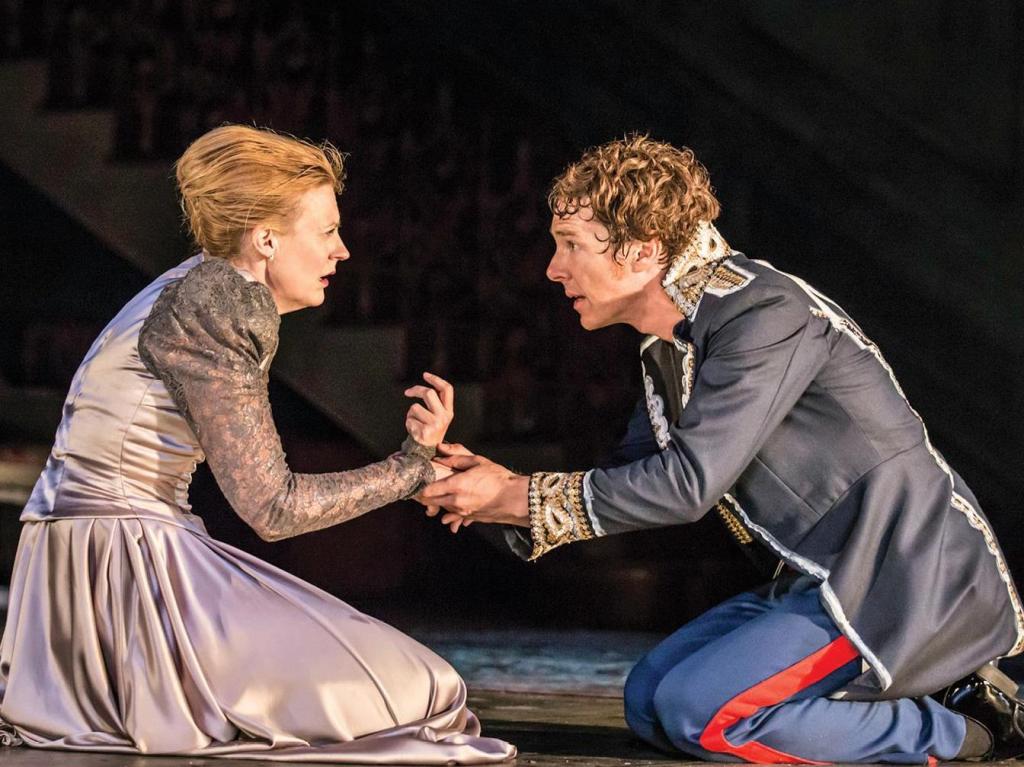Anastasia Hille and Benedict Cumberbatch in Hamlet. Photo by Johan Persson.
If you haven’t heard already, the National Theatre’s production of Hamlet is the fastest selling ticket in London theatre history. The fact that Benedict Cumberbatch (Sherlock, The Imitation Game) plays the Prince is solely responsible for this, but to my mind, anything that gets people to the theatre to see Shakespeare is a good thing. This Hamlet comes to the National Theatre via Sonia Friedman Productions, and is directed by Lyndsey Turner (Posh, Chimerica). It’s a terrific production; Cumberbatch is fantastic; the whole bloody thing is fantastic. The production beautifully balances all the elements that make Hamlet so enduring, taking a non-clichéd approach to the world’s most famous play.
Cumberbatch is entirely natural even when delivering Hamlet’s most well-known lines. The words come from a need to say them, as the actor explains in a chat with Melvyn Bragg in a short film screened beforehand. The production drops the usual opening scene and begins with the latter part of scene two, with the first part following. (There are other cuts and pastes along the way but they all work). Cumberbatch gives us glimpses of the funny, clever and playful side of the Prince as he was before his father’s death: we see this in his rapport with Horatio, and with Rosencrantz and Guildenstern (Matthew Steer and Rudi Dharmalingam). We also get a sense of a nuanced and gritty Hamlet.
Similarly, Ophelia (Sian Brooke), a photographer, is not in the least fey or delicate, rather she’s a complex and increasingly confused young woman; the audience is invited to see how she symbolises the innocent victim of the ‘something rotten in the state’ through her taking pictures and her unravelling state of mind. She knows Hamlet and trusts her understanding of their relationship, so the internal conflict she succumbs to is heartbreaking to witness. Gertrude (Anastasia Hille, again in a sensitive and personable performance as Queen, newlywed and matron) silently delivers one of the most emotionally poignant scenes when she opens Ophelia’s suitcase (symbolically doubling as a coffin for Polonius) which is full of photographs plus Ophelia’s camera; only then does Gertrude realise that Ophelia is saying goodbye. Gertrude rushes after Ophelia but we know she’s too late. There’s a subtle sense of the existing relationship between these two, adding weight to a later moment when Gertrude speaks at Ophelia’s midnight funeral.
Ciaran Hinds is sinister and impressive as the morally compromised Claudius. What a dangerous character and how well Hinds brings him to the stage. Polonius is played by Jim Norton as dithery but not as a buffoon; the same goes for Horatio (Leo Bill), and also for the grave-digger (Karl Johnson, who doubles as the ghost); he gets to spin out his wit in the Yorrck scene with a say-it-like-it-is labourer’s dignity nodding to tradition. Lighter moments feel right in context – you forget how they are specifically crafted and positioned by Shakespeare for psychological and narrative balance. Laertes (Kobna Holdbrook-Smith) is vulnerable and intense, full of active energy in contrast to Hamlet’s moments of introspection.
The set design employs dramatic tableaux and symbolic imagery – the scene where Ophelia departs for the river, for instance, and especially the slowed-down finale when Hamlet slays Laertes. This Hamlet is an exuberant production; there’s a huge gothic approach to staging; it’s fabulous and very satisfying. There’s a chunky gritty soundscape contributing to the successful (I think) mash-up of past and present. Some odder moments include Hamlet playing giant toy soldiers by himself; there is a nod to the isolated tortured modern adolescent, even to the nerd, in some of his scenes, which might have been jarring had they not fallen short of self-consciousness. Modern references underline the timelessness of the whole piece. Just before interval a great wind blasts through and covers the entire set with leaves.
Cumberbatch offers a Hamlet curious about the motives of the people around him even while paralysed by grief. He questions the importance of values over deeds. The moment where he decides to fully commit to action captures the entire tragedy of the play; you’re made sadly aware that he knows it will be his undoing.
Rating: 4 stars out of 5
Hamlet
Starring Benedict Cumberbatch
Directed by Lyndsey Turner
Set design by Es Devlin
In limited national release from 7 November
See website for details





